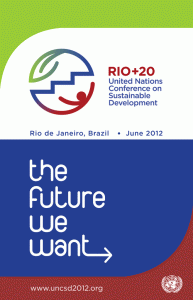Here are a couple of reports by our correspondents from the youth delegation to Rio+20.
1. The impacts of toxic agriculture
2. Cleaning out the pantry of the United Nations
The impacts of toxic agriculture
By Brittany Laidlaw
Feeding the excess 2.3 billion people set to occupy the planet by 2050 should be on the minds of world leaders as they converge at the Rio+20 Summit this week.
In the face of what is now being viewed as the next world food crisis, effective commitments towards securing global food security and rethinking the future of commercial agriculture production should be a fundamental priority.
The UN Food and Agricultural Organisation (FAO) recognises the profound transition needed towards sustainable agricultural systems to deliver healthy and nutritious food for the next generations to come, particularly in developing nations. However, the industrialisation of Western agricultural systems and a shift towards petroleum-dependant practices since the 1950s poses a significant threat to securing a future of food for all.
Over the past 30 years, Western methods of food production which heavily rely on petroleum to produce, transport and package food have expanded throughout most regions of the world creating adverse effects on the health of the world’s natural resources and the back-pocket of small-scale farmers. Incidentally, current levels of food production require ten calories of fossil fuel energy to produce one calorie of food energy. Furthermore, governments continue to support these unsustainable agricultural systems and have failed to act on previous agreements made at the first Earth Summit.
Products such as pesticides and synthetic fertilisers widely used in conventional farming practices are among the many toxic products created from petro-based chemicals. The intensification of these chemical inputs has come at a significant cost that is now showing its face in developing nations such as Africa and India.
Years on from the Not-So-Green Revolution the land is now degraded and becoming less productive. Studies reveal that the earth’s natural resources have become seriously disadvantaged by the extensive use of contaminants which cause air, soil and water pollution. Even scientists maintain that major threats to agricultural sustainability, either through environmental impacts or resource depletion, exist within the excess use of modern inputs.
Pesticides directly impact the earth’s soil capacity to grow crops as well as the affordability for small scale farmers to produce food as oil prices rise. With small holder-farms in developing nations providing almost 80 percent of food, these ecologically and economically costly methods jeopardise the viability of small-scale farm production.
In particular, West African nations which remain significantly under-educated in the negative impacts of pesticide use continue to risk the vulnerability of their crops using Western pest management practices.
William Settle, the FAO Senior Technical Officer recognised that “trends in agriculture over the past decades in West Africa have seen an increasing use of highly toxic pesticides in higher-value, frequently irrigated crops. There is a general lack of knowledge in the region of the negative impacts of pesticides on the production, economy and health of communities and the environment”.
Although Africa’s pesticide use is minimal compared to developed nations such as Australia and the US, the global use of pesticide use by any measure, whether tonnes used or hectares sprayed, is still significantly rising. Whilst some maintain that Western agricultural production is the only viable way to feed the mass populations of the world, this may not be the case in African nations where these practices have proven to be severely damaging and costly.
Although the mantra in drafts leading up to the Rio+20 Conference is to sustainably increase agricultural production, current industrial practises impose large challenges on the maintenance of sustained yield capacity. Furthermore, governments have a tendency to add the word ‘sustainable’ in front of any kind of development proposed within draft submissions but do little to explain what this actually means.
Even when specifically asked, Australian government officials are unable to define what plans are actually in place to pursue this so called ‘sustainable’ intensification of agriculture. The question therefore remains how this will be achieved without the continuation of ecological impacts reared by the Green Revolution.
But to the credit of government organisations such as AusAid, Australia has been committed to providing emergency response and market assistance for food scarce African communities. However, there is little focus on resilience building through sustainable agricultural programs which promote independency such as Integrated Pest Management.
Over the past few decades, a wide amount of research has been conducted into the development of such programs which have proven significantly beneficial both in restoring the environment’s capacity to produce sustainable crops and improving the health of farmers through the reduction of chemical exposure. However, research currently relies on partnerships with NGOs and farmer organisations due to a subsequent loss of government financing that previously supported the Western agricultural practices.
Although Integrated Pest Management has made its way into texts for the Conference, the lack of commitment to these programs over the past 20 years undermines its existence within the outcomes of Rio.
Only time will tell if governments wake up to the serious action they must take to feed a global population of 9.3 billion people.
Brittany Laidlaw is a member of the Global Voices Rio+20 Australian Youth Delegation and a student at Griffith University’s Honours College.
 Cleaning out the pantry of the United Nations
Cleaning out the pantry of the United Nations
By Sarah Douglass
The United Nations Commission on Sustainable Development, established at the Rio Earth Summit 20 years ago, has been plagued by a lack of recognised authority and cooperation from both member states and other UN institutions. Much like a weevil infested flourbag; the Commission on Sustainable Development has been relegated to the back of the international community’s pantry, in the vain hope that its overbearing mother-in-law (the Economic and Social Council or ECOSOC) will not draw attention to its staleness and toss it out with the trash. The international community has recognised the inefficiencies of current UN environmental bodies and efforts to establish pathways to solutions have led to a number of suggestions. The United Nations Conference on Sustainable Development, Rio+20 – Currently being held in Rio de Janeiro, Brazil – constitutes a critical opportunity for the international community. High-level negotiations have taken place regarding the establishment of a set of Sustainable Development Goals (SDGs) to supersede the near-expired Millennium Development Goals. In order to effectively establish and monitor the SDGs, thereby ensuring successes greater than those of the blighted Commission on Sustainable Development, an overarching, interdisciplinary body must be created. Along with discussions on the Sustainable Development Goals, negotiations at Rio+20 have also been focussed on an Institutional Framework for Sustainable Development. Negotiated under the heading of the Institutional Framework for Sustainable Development (IFSD), discussions have primarily focussed on the strengthening of the United Nations Environment Program; the potential transformation of ECOSOC; and the re-invigoration of the Commission on Sustainable Development.
The dominant principal of “sustainable development” is that it integrates the three pillars of society, the economy and the environment. The UN managerial organ ECOSOC currently contradicts this fundamental premise. Despite incorporating the various functional committees, specialised agencies, programmes and funds associated with the environment and “sustainable development” within its responsibilities, the Economic and Social Council clearly regards the environment as being less significant. This has led to an ideological imbalance of the three pillars and examples antiquated development practices.
Along with a strengthening of the financial and technical capacity of UNEP – the crucial environmental pillar, the United Nations General Assembly should give ECOSOC a mandate to adopt the ideologies of cooperative institutionalism to better coordinate inter-institutional actions and reduce duplication and waste between the various functional committees, specialized agencies, programmes and funds. In effect this would generate a system whereby institutions would interact cooperatively and collectively to solve common and/or related problems. To effectively and efficiently facilitate and coordinate this notion of cooperative institutionalism, an overarching body would provide the strong institutional framework required. The existing principal organ of ECOSOC would be the ideal structural instrument for a Sustainable Development Council (SDC) and would enable a rapid transition to a more legitimised network of sustainable development.
It is not a matter of simply re-badging ECOSOC; it is the elevation of the vital principal of sustainability to the status of a council both in name and policy, thereby ensuring that the underlying framework of the various functional committees, specialized agencies, programmes and funds is a sustainable one. This will be further developed if the Sustainable Development Council is allocated the further managerial and coordinative role. One of the dominant focus areas for the Rio+20 Summit, as has been identified, is the strengthening of the Institutional Framework for Sustainable Development. Society has become disillusioned with the sheer volume of institutions associated with the United Nations. It is clear that improvements on existing institutions are essential, rather than the generation of more. This in turn would reduce waste, avoid duplication and centralize responsibilities.
The upgrade of the Economic and Social Council with a Sustainable Development Council would not only aid in the development of multi-dimensional indices that incorporate the three pillars of sustainability, but, through its very existence, would endorse the fundamental premise of sustainable development – being that both the economy and society are presided over by environmental limitations. What is required internationally is a paradigm shift of the ideological conception of development. The Sustainable Development Council would pave the way for this new direction and would also reduce the waste, overlapping and time delay that would occur should ECOSOC remain in its present institutional state, whilst yet another subsidiary institution is added to the United Nations framework. It is time to toss out that weevil-infested flour and introduce a new mix that will bake a bread to truly sustain the planet.
Sarah Douglass is a member of the Global Voices Rio+20 Australian Youth Delegation.
Further reading – See Anna Rose’s interview with former NZ PM, Helen Clark:
http://annarose.net.au/2012/06/20/a-view-from-across-the-pond/#more-457

